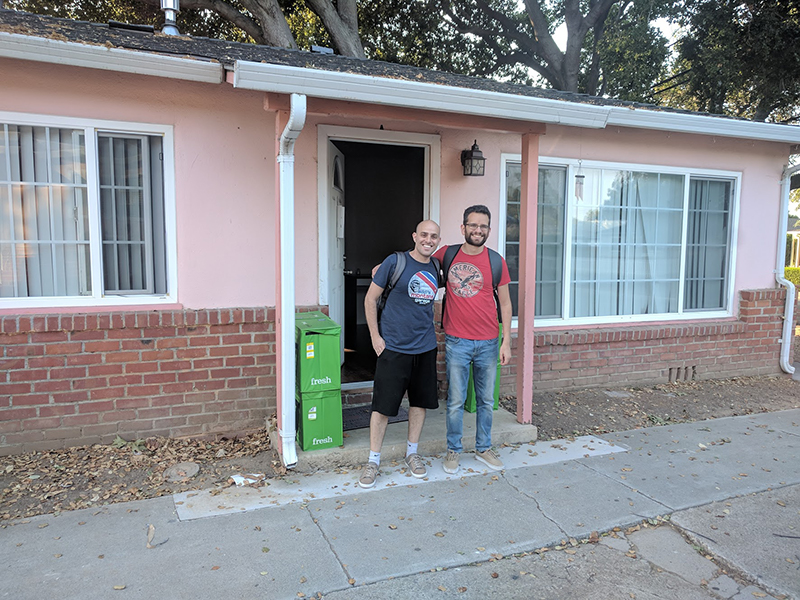Rotem Yakir shares Guggy’s story of evolving from "just another Israeli Startup" to a YC startup
- 1.From Wolf of Wall Street to a "Made Man" in Silicon Valley
- 2.How LendEDU Raised the Most Valuable Seed Round Imaginable with Y Combinator
- 3.Kyle Killion's story of getting Suiteness into Y Combinator along with tips on how to apply
- 4.Rotem Yakir shares Guggy’s story of evolving from "just another Israeli Startup" to a YC startup
- 5.The True Story of How Orion Willow Got Lendsnap Accepted Into Y Combinator
- 6.Nicky Goulimis shares Nova Credit's Path to Y Combinator Acceptance and Beyond
- 7.Katherine Nammacher Chronicles RideAlong’s Journey Into Y Combinator
- 8.The Story of How a Sofa Startup Got Into Y Combinator with Just a Pitch Deck
- 9.The story of how two college friends joined forces to disrupt an industry with Iris Automation
- 10.How 4 Swedes got their SaaS accepted into Y Combinator while still at $0 MRR
- 11.The story of when 8 x Co-Founders flew from Denmark to San Francisco for Y Combinator
- 12.Ryan Chan the founder of UpKeep shares his Y Combinator Journey
- 13.Pedro Goes of InEvent shares his Y Combinator Journey
- 14.Itay Forer of Cleanly shares his Y Combinator Journey
- 15.How to get into Y Combinator according to the founders that did get in
- 16.What It Was Like Doing Y Combinator a Second Time
Rotem Yakir is the co-founder and CEO of @ Guggy, a tool which helps you make your friends laugh by turning your text messages into engaging content, such as personalized GIFs.
Tell us a bit about yourself and your reason to join Y Combinator
I remember seeing the Y Combinator name back in 2012 and thinking to myself, “Oh my God, it will be just crazy to get accepted there!” it was just a dream to apply and get accepted.
Y Combinator really is the most prestigious startup accelerator in the world.
And as someone who’s founded two companies and is working as a founder for the last 12 years, Y Combinator was the big name in the space and what you’re always dreaming of getting into.
So when we started to see some nice traction in one of our products, which is an API to convert the text message into a .GIF., we decided this was our opportunity to go for it.
With a few thousand free users at that point, we filled in the application to Y Combinator.
How much time and effort did you put into the application?
I think about two to three days of research and writing the application and another half a day to record the one minute video.
And what were the biggest benefits beyond just the money from entering into YC?
On demo day we managed to secure $75,000, but we managed to raise another million a few months after.
So yes, the money, was definitely important.
But you also get into a prestigious collection of people who managed to get into Y Combinator.
The community is great, every day I’m reading and posting in the private forum that they have, and also it really helped us raise that initial seed round.
Did you guys set up the company in San Francisco and just work it remote from Israel, or did you live in San Francisco for a while?
We started the company in Israel in 2015.
When we got accepted to Y combinator one of the things that they ask you to do is to create a USA C-Corp based in Delaware.
So we did it and moved all our all of our holding in the Israeli company to the US company.
But our family was in Israel.
We continued working in Silicon Valley while doing the YC program for three months.

This is me and my co-founder in front of the house we rented while we were at YC
If I could do things differently I definitely would have stayed in the US after the YC the program in order to raise the money there, but because I had three small children and my wife been alone for 3 months I couldn’t leave her again.
So I had to do all the fundraising from here from Israel.
But we managed to raise a large round of money without flying to the US or even meeting face-to-face the investors while we were in Israel!
When you find a VC that believes in you, you don’t necessarily need to meet them face-to-face.
You can raise the round using Skype.
We’re not the only one, I’ve heard many stories about Y Combinator founders that managed to raise funds remotely.
The last question if you have one single tip for founder’s thinking of applying.
They need to study how to file the application.
Founders really need to read a lot about what how the interview is going to be. Even if it’s 10 minutes. For example, we read a lot and prepared I almost 100 questions they could possibly ask us. We started to ask each other non-stop to make sure we have good answers to all potential questions.
In the interview, they asked us some of the most common questions and we had the answer immediately.
Because of our preparation, we looked very comfortable and at ease and that really projects a very positive image.
Most of the questions are typical, but I also suggest to get ready and study more elaborate questions.
Just make them up and just imagine what your worst question would be. Face your fears.
Most of the questions we came up ourselves and we just tried to attack the company and what we did was ask questions like, “why is it good, why people should use it, even if they use it how will you make money,” and other questions like that.
This is why I asked my co-founder to hit me with as many questions as he can by thinking like an investor and I did the same to him.
You have to really try and destroy your idea, which is sometimes uncomfortable for founders.



